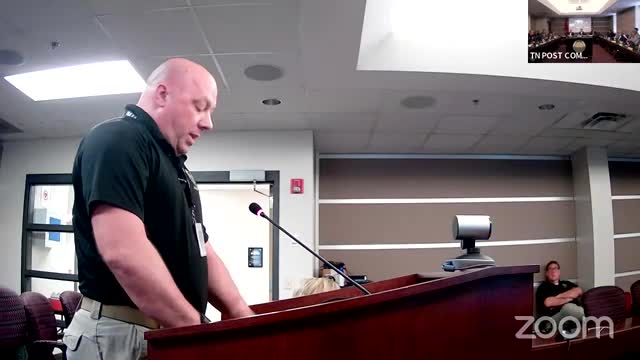Investigation Reveals Discrepancies in Police Academy Applications
August 16, 2024 | Commerce & Insurance, Deparments in Office of the Governor, Organizations, Executive, Tennessee
This article was created by AI summarizing key points discussed. AI makes mistakes, so for full details and context, please refer to the video of the full meeting. Please report any errors so we can fix them. Report an error »

In a recent government meeting, significant discussions centered around the application and certification processes for law enforcement officers, particularly focusing on two cases involving Deputy Jason Roberts and former officer Davin Ray McGraw Glasson.
Deputy Roberts, who applied to a police academy, faced scrutiny over discrepancies in his application. He indicated on his application that he had never attended a basic police training academy, despite having participated in an orientation session at the Toledo academy, which is considered the start of the training. During the meeting, it was revealed that Roberts had marked \"no\" on his application regarding prior academy attendance and had not obtained a necessary waiver for his change of academy status. The commission expressed concerns about the integrity of the application process, particularly regarding the similarity in handwriting on his recommendation letters, which raised suspicions about their authenticity.
Roberts explained that he believed he was providing accurate information based on his understanding of the academy's requirements and the stress of personal circumstances. He acknowledged that he may have misunderstood the significance of the orientation session. The commission debated the implications of disapproving his waiver request, which could prevent him from receiving certification and returning to the academy.
In a separate case, the commission discussed the situation of Davin Ray McGraw Glasson, who was found to have misrepresented his military discharge status on his application for certification. Glasson checked \"no\" to military service on multiple forms, despite having an uncharacterized discharge that requires a waiver for certification. The commission noted that this misrepresentation could be seen as an integrity issue, particularly since it led to his disqualification from employment with the Sumner County Sheriff's Department.
The commission deliberated on the appropriate course of action for both cases, considering the need for transparency and integrity in the law enforcement certification process. They decided to invite both individuals to future meetings to clarify their situations and determine the next steps regarding their certifications.
Overall, the discussions highlighted the importance of accurate reporting in law enforcement applications and the potential consequences of discrepancies, emphasizing the commission's commitment to maintaining high standards within the profession.
Deputy Roberts, who applied to a police academy, faced scrutiny over discrepancies in his application. He indicated on his application that he had never attended a basic police training academy, despite having participated in an orientation session at the Toledo academy, which is considered the start of the training. During the meeting, it was revealed that Roberts had marked \"no\" on his application regarding prior academy attendance and had not obtained a necessary waiver for his change of academy status. The commission expressed concerns about the integrity of the application process, particularly regarding the similarity in handwriting on his recommendation letters, which raised suspicions about their authenticity.
Roberts explained that he believed he was providing accurate information based on his understanding of the academy's requirements and the stress of personal circumstances. He acknowledged that he may have misunderstood the significance of the orientation session. The commission debated the implications of disapproving his waiver request, which could prevent him from receiving certification and returning to the academy.
In a separate case, the commission discussed the situation of Davin Ray McGraw Glasson, who was found to have misrepresented his military discharge status on his application for certification. Glasson checked \"no\" to military service on multiple forms, despite having an uncharacterized discharge that requires a waiver for certification. The commission noted that this misrepresentation could be seen as an integrity issue, particularly since it led to his disqualification from employment with the Sumner County Sheriff's Department.
The commission deliberated on the appropriate course of action for both cases, considering the need for transparency and integrity in the law enforcement certification process. They decided to invite both individuals to future meetings to clarify their situations and determine the next steps regarding their certifications.
Overall, the discussions highlighted the importance of accurate reporting in law enforcement applications and the potential consequences of discrepancies, emphasizing the commission's commitment to maintaining high standards within the profession.
View full meeting
This article is based on a recent meeting—watch the full video and explore the complete transcript for deeper insights into the discussion.
View full meeting
